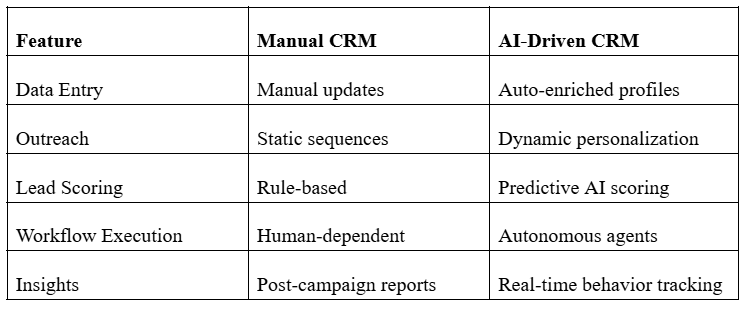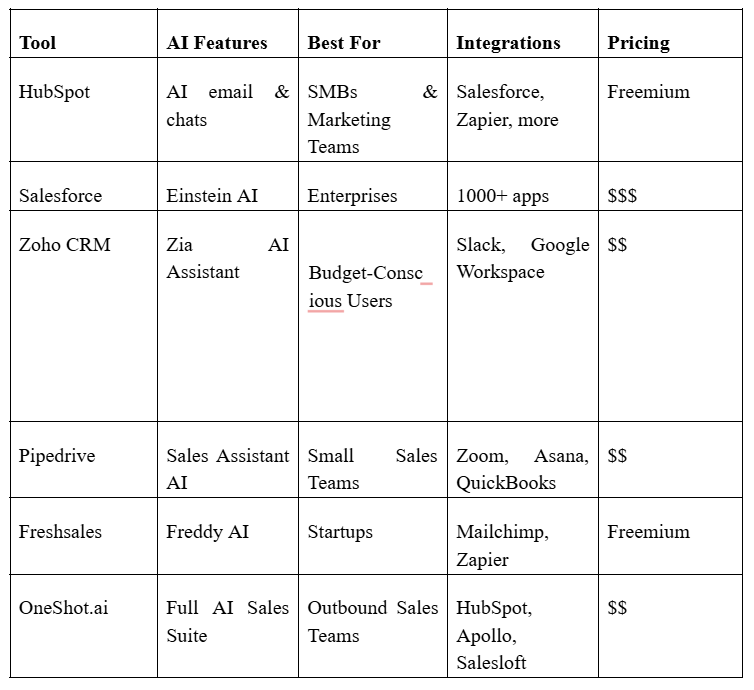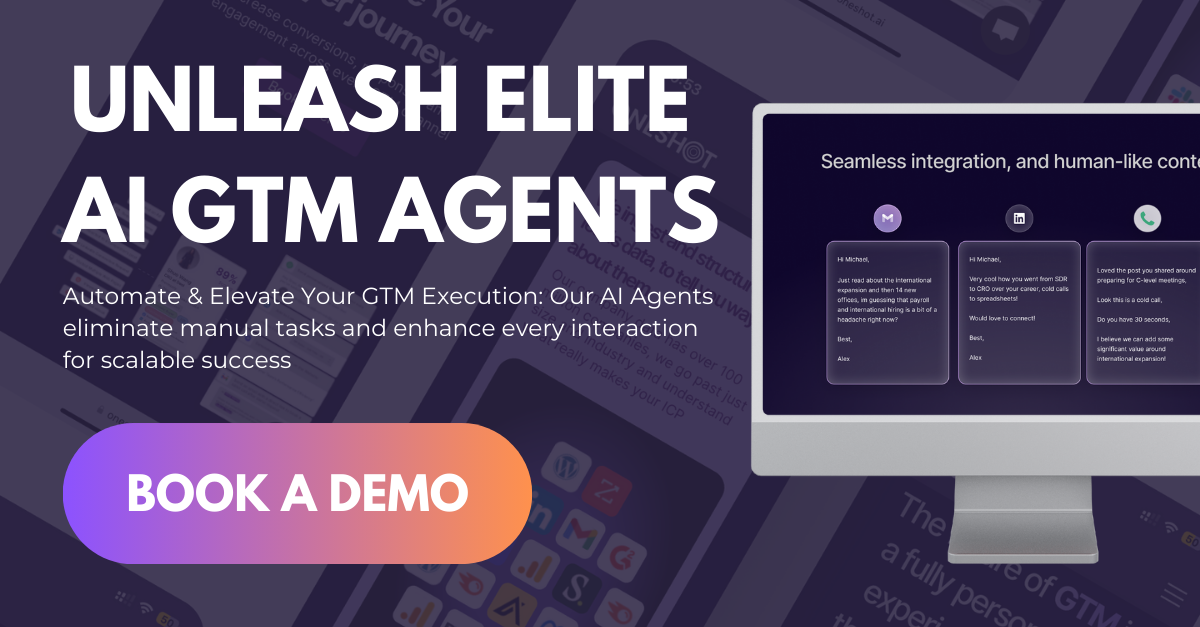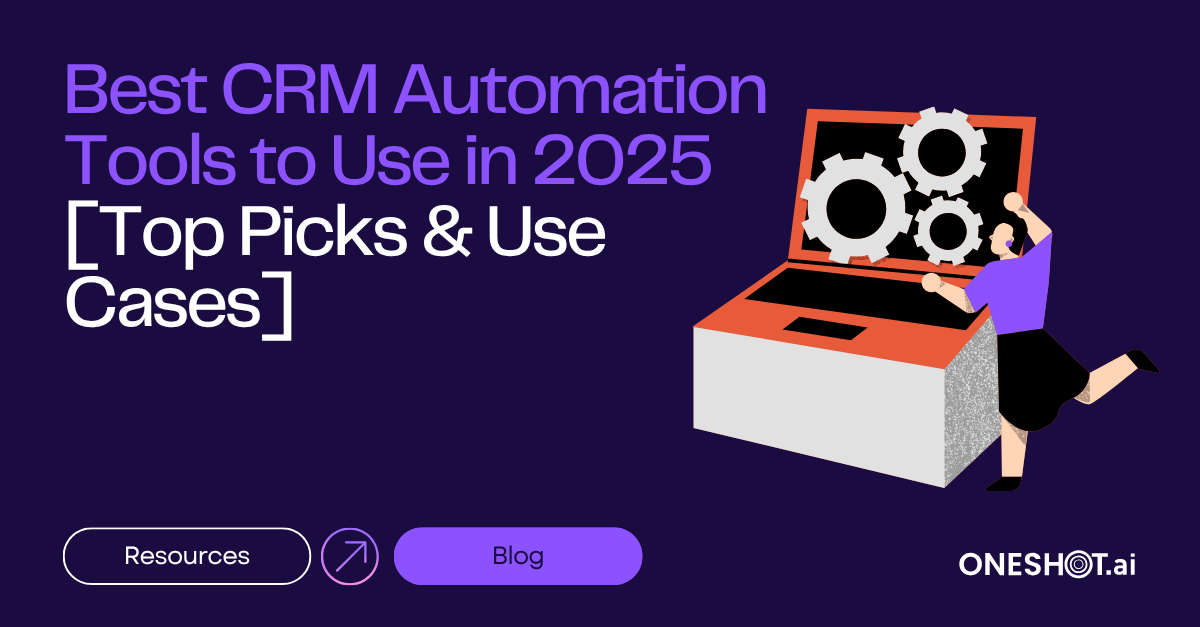CRM Automation Tools: What to Use in 2025
Why 2025 Is the Year of CRM Automation
In 2025, the need for smart customer relationship management (CRM) solutions is greater than ever. As B2B businesses compete to grow faster, reduce operational overhead, and deliver personalized experiences at scale, the traditional CRM is quickly going out of style. With buyers wanting in-the-moment, hyper-relevant engagement, the onus is on sales and marketing teams to abandon legacy systems and shift towards automation-first CRM approaches.
The world CRM software market, as per Statista, is projected to reach $131.9 billion by the year 2028s. This growth is indicative of a fundamental shift in how companies interact with leads—driven not merely by improved databases, but by intelligent systems capable of acting, learning, and tailoring their approach to each individual.
Salesforce predicts that AI-integrated CRMs will become the default by 2025, enabling teams to auto-generate outreach, instantly qualify leads, and orchestrate personalized journeys without requiring human micromanagement. From AI sales agents to predictive lead scoring, the age of autonomous CRM is here.
Automate your outbound with OneShot.ai’s AI agents — see how »
What Is CRM Automation & Why It Matters in 2025
CRM automation uses technology, especially artificial intelligence, to simplify and optimize workflows that revolve around customer relationships. It allows for more than simply keeping track of contacts. Automation in CRM can be data enrichment (i.e., adding new customer information to existing customer records) from any data source at any time without manual data entry.
With AI-generated follow-ups, sales teams can personalize and automate every follow-up, on-time, and at scale. Predictive lead scoring provides sales teams with which prospects are most likely to close as well as what options to pursue if they do.
Smart pipeline management can manage workflow in a way that allows deals to flow through a team in real time while minimizing or alleviating friction in the deal-closing process. All dimensions of personalized experience can be dynamic, allowing for every touchpoint to be personalized based on customer activities in a seamless, output-driven engaging customer journey.
With CRM automation in 2025, B2B sales teams have major benefits, including:
✅ Saving time: Reps spend way less time doing manual data entry, and can spend more time on high-value selling activities.
✅ No lead leakage: No leads ever fall through the cracks, as automated follow-ups improve retention.
✅ More engagement: Personalized engines can create prescriptive or adaptive messages based on account persona, purchase intent, and customer behavior.
✅ Marketing-to-sales alignment: Automation makes sure leads are handed off seamlessly and that all sales reps are tracking the lifecycle of a lead.
Legacy CRMs usually lack in modern high-speed selling environments. Sales reps get bogged down with manual data entry, losing precious time that could be spent connecting with prospects. Off-the-shelf, one-size-fits-all email sequences don't connect with leads, leading to weak outbound ROI. Without the power of real-time data, teams are flying blind as to what works and what doesn't—preventing them from optimizing strategy at the moment.
Contrarily, 2025 CRM automation trends are transforming the way teams work. Hyper-personalization at scale enables reps to send customized messages to tens of thousands of prospects with little effort. AI copilots augment sales reps by offering next-best actions, composing emails, and assessing deal risk. Autonomous agents are now capable of executing full-blown outreach campaigns, while live sentiment and engagement monitoring provide teams with the real-time visibility they require to course-correct and close more deals.
Sidebar: Manual CRM vs AI-Driven CRM in 2025

Want 10x better outreach from your CRM? Try OneShot.ai’s AI Sales Platform »
Top CRM Automation Tools to Use in 2025 (Comparative Guide)
In order to analyze the top CRM automation tools in 2025, we had five main criteria: AI functionality, usability, depth of integration, scalability, and outbound performance.
Comparison Table:

Here's the summary:
- HubSpot: Great for growing teams that want an intuitive UI and connected marketing automation. Doesn't allow you to personalize deeply outside of outbound automation.
- Salesforce: Great enterprise tool, with strong AI capabilities, but very complex and expensive for lean teams to leverage well.
- Zoho CRM: Offers great value for small businesses, and decent AI, but can't competitively scale or offer the depth of AI of the more expensive options.
- Pipedrive: A simple streamlined, CRM designed for pipeline management. A great simple tool, but lacks AI personalization.
- Freshsales: Offers Freddy AI, complete with chat and lead scoring. Launch a budget-friendly tool for early-stage start-ups.
- OneShot.ai: Designed for sales teams seeking AI-first automation across the outbound, with the capability of deep personalization, autonomous workflows, and real-time agent guidance.
✅ OneShot.ai Highlight Box:
OneShot.ai marries CRM-like smarts with complete outbound automation. Through agents such as Insight, Persona, and Personalization, it learns and adapts in real-time to provide precision targeting at scale.
See OneShot.ai in Action — Book a Demo »

The Rise of AI-Powered CRM Agents
AI-powered agents are revolutionizing CRMs from static contact lists to real-time, dynamic, intelligent platforms that act upon data. The Insight Agent collects and updates prospect data constantly—industry, funding activity, and behavioral signals—so the sales team has the most up-to-date information at hand. The Personalization Agent further uses that data to create individualized, hyper-relevant email content specific to each recipient's context and interests. At the same time, the Scaling Agent maximizes high-volume and high-quality outreach by automatically optimizing timing, frequency, and cadence to achieve peak impact.
Legacy CRMs are bogged down with static data, generic outreach templates, and limited campaign optimization—resulting in a lack of ability to scale meaningfully or personalize effectively.
Agent Workflow Visual (Suggested):
"Lead comes to CRM → Insight Agent enriches → Persona Agent segments →Personalization Agent builds messaging → Scaling Agent deploys + monitors."
⭐ G2 Review:
"OneShot.ai’s AI agents replaced the need for three tools in our stack. Our outbound now runs 24/7 — smarter, faster, better."
Use OneShot.ai’s Insight Agent to replace hours of research »
Choosing the Right CRM Automation Tool in 2025 – Buyer’s Checklist
Before selecting a CRM automation tool, keep these points in mind:
- Integration: Does it integrate with your stack? (Salesforce, HubSpot, Outreach, Zapier)
- AI Depth: How deep is its predictive and content-generation capability?
- Campaign Management: Can it handle multi-step, multi-channel outreach?
- Personalization: Is it dynamic, or merely token-based?
- Real-Time Enrichment: Does it auto-enrich leads with web and behavior signals?
- Lead Scoring: How adaptive and accurate is its scoring engine?
Must-Have CRM Integrations in 2025
CRM integrations are not just nice to have - in today's sales ecosystem, they are critical. If a company is going to fully optimize performance, the company's CRM must integrate with its other sales technology tools. Connecting the CRM to outreach capabilities has to power consistent revenue flow while integrating with an enrichment tool provides precise targeting of the best leads. Add in AI agents, and you almost have a walk-up sales machine that fills the pipeline autonomously.
OneShot.ai seamlessly slots into this new sales process. It ties into HubSpot to synchronize with your marketing automation seamlessly, draws on enriched contact information from Apollo, and integrates with Outreach and SalesLoft for high-impact sequenced outbound. The outcome? A sales stack that flows from CRM to enrichment to intelligent automation—to closed deals.
Add OneShot.ai to your CRM in 15 minutes — Start now.

Real-World Case Studies: CRM Automation in Action
A B2B tech company knew outbound reply rates were low, but it suspected this was not correlated to the product it was promoting. After using OneShot.ai’s Persona Agent and dynamic messaging, the company had a 3x increase in outbound responses—moving outreach from a numbers game to engagement.
A HealthTech SaaS team was plagued with persistent delays from manual prospect research. With auto-enrichment from the Insight Agent, every SDR freed up more than 20 hours of their week for higher-value discussions and quicker pipeline momentum.
An accelerating startup required prospecting at scale across multiple regions without increasing headcount. With a single agent workflow, they deployed fully automated AI-driven outreach campaigns in three international markets—efficiently and effortlessly.
All of these victories were possible due to automation—not as an added feature, but as the driving engine behind each step of the sales motion.
Predictions for the Future of CRM Automation
The path forward is to a world where CRMs are more than tools, but rather intelligent machines that inform every sales action. Look for smarter AI copilots that recommend the next-best actions taken in the context of actual buyer behavior, predictive analytics that anticipate conversions with accuracy, and complete multi-channel orchestration—all accessible within your CRM.
AI agents will always learn and fine-tune messaging against sentiment, performance, and timing, making every campaign a living, learning machine. 2025 winners will not only use AI—they'll integrate it deeply into their CRM processes.
Pro Tip: Integrate OneShot.ai with your CRM to create smart, self-optimizing outbound pipelines.
Conclusion: Automate or Be outpaced
CRM automation is no longer a "nice-to-have." It's foundational. As AI redefines customer engagement, legacy CRMs are fading away to platforms that do something with the data, not merely place it. From Insight Agents to outbound personalization at scale, the tools are ready—and businesses need to be too.
OneShot.ai is at the forefront by bringing CRM-like functionality together with AI-driven sales automation.
Ready to re-evaluate your 2025 CRM strategy? → Get your free consultation with OneShot.ai now »
FAQs
1. Which CRM automation tool is most in demand in 2025 for small businesses?
In 2025, HubSpot CRM remains one of the most in-demand automation tools for small businesses due to its free tier, powerful marketing automation features, and user-friendly interface. Zoho CRM and Freshsales are also popular for their affordability and AI-driven workflows.
2. What is the future of CRM automation in 2025?
The future of CRM automation in 2025 is AI-powered personalization, predictive analytics, and full sales-marketing-service integration. Tools now offer advanced chatbots, lead scoring, and automated task assignment to increase productivity and improve customer experiences.
3. What is the best free CRM automation tool to use in 2025?
The best free CRM automation tools in 2025 include HubSpot Free CRM, Zoho CRM Free Edition, and Bitrix24. These platforms offer contact management, basic automation, and email marketing features without monthly fees—ideal for startups and solopreneurs.
4. What is the number one CRM tool with automation in 2025?
As of 2025, Salesforce is still the leading CRM tool overall, offering advanced automation features, AI-driven insights through Einstein, and extensive customization options for enterprises. For smaller teams, HubSpot ranks #1 in usability and integration capabilities.
5. Which CRM automation software works best with email marketing tools?
CRM platforms like ActiveCampaign, Mailchimp CRM, and Keap (formerly Infusionsoft) excel in combining CRM functions with powerful email marketing automation—ideal for businesses focusing on customer journeys and nurture campaigns.
6. What are the top business automation tools that integrate with CRM platforms?
Top business automation tools that integrate seamlessly with CRMs in 2025 include Zapier, Make (Integromat), Trello, and Asana. These tools automate workflows like lead generation, follow-ups, and task assignments across platforms.
7. What CRM automation tools support AI-driven lead scoring and behavior tracking?
Platforms like Zoho CRM, Salesforce, and Freshsales offer advanced AI features such as behavioral tracking, lead scoring, and forecasting, allowing businesses to prioritize leads and automate follow-ups effectively.
8. How can automated CRM software improve customer experience in 2025?
Automated CRM software improves customer experience by personalizing interactions, automating repetitive tasks, offering real-time support via chatbots, and keeping customer data updated and accessible for all departments.
9. What’s the best CRM automation platform for e-commerce businesses in 2025?
For e-commerce, Klaviyo, Shopify CRM, and ActiveCampaign are top choices in 2025. These tools automate cart recovery emails, customer segmentation, and product recommendations based on buyer behavior.
10. Are there marketing automation tools that offer built-in CRM features for free?
Yes, Mailchimp, Zoho, and EngageBay offer free or freemium plans with marketing automation plus built-in CRM features—perfect for growing businesses that want an all-in-one platform.




.png)
%20(1).png)
.png)
